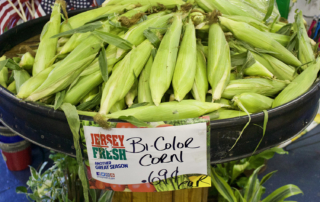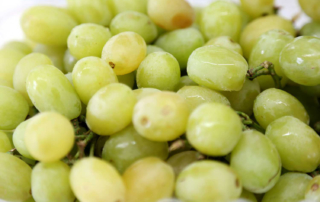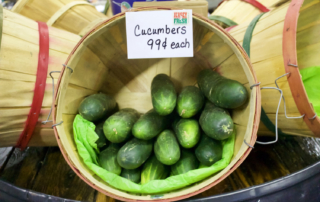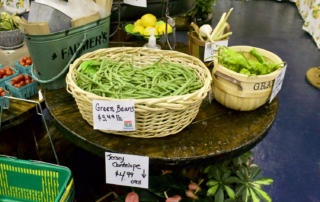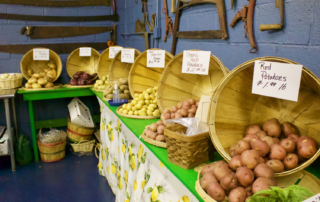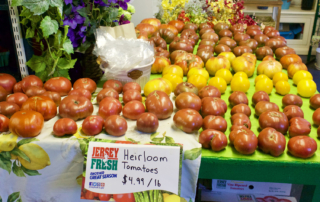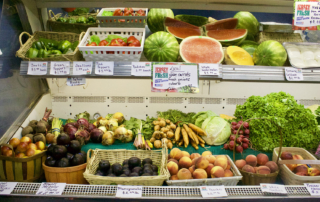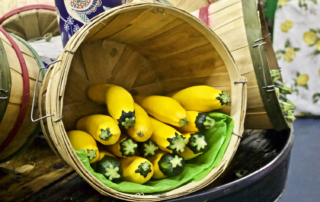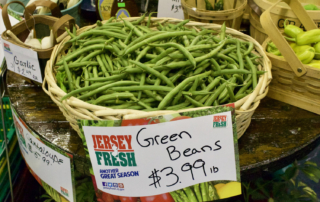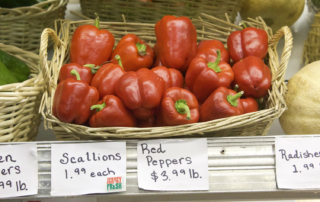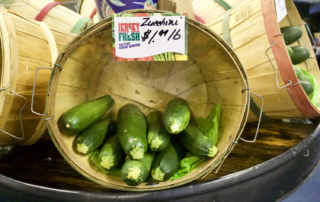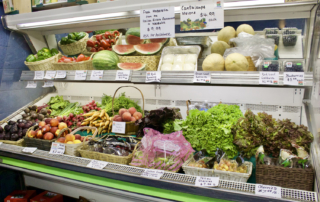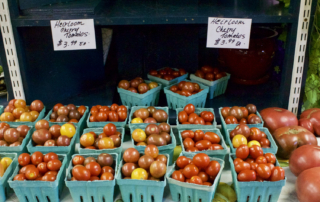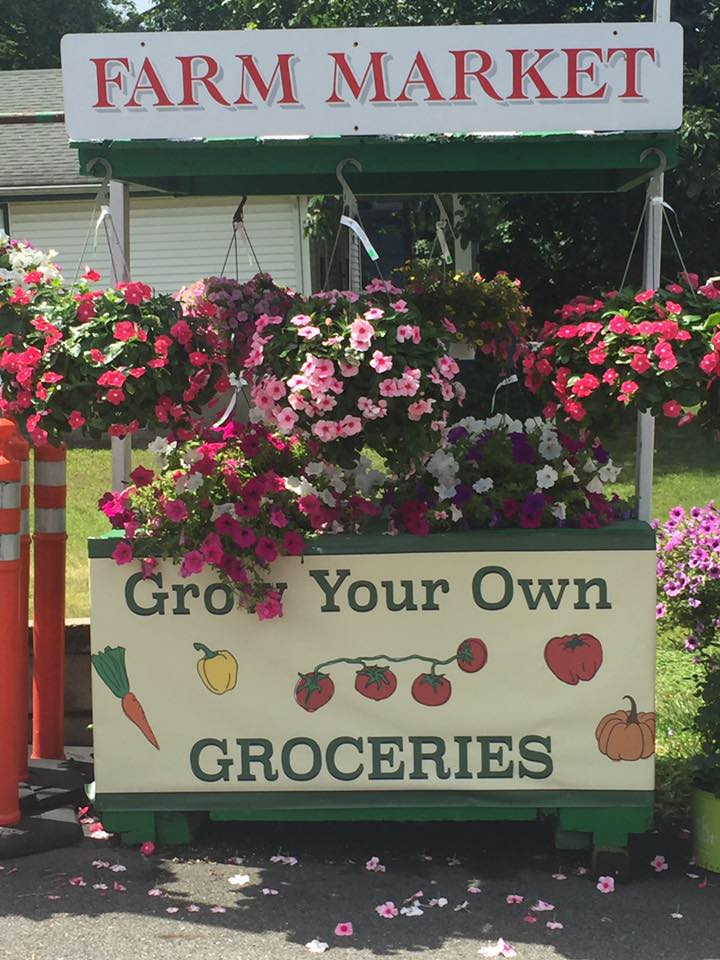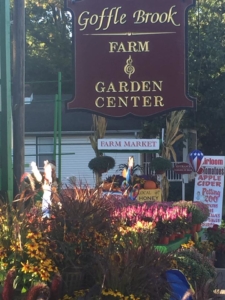“Knowledge is knowing a tomato is a fruit. Wisdom is not putting it in a fruit salad”
Produce – Pantry – Culinary
Choosing and Storing Produce
Go home right after the market. Don’t leave the produce in the car to run other errands or baking in the sun while getting breakfast. Head home and store them properly, as soon as you arrive. Keep the produce out of sunlight once home. Do not store fruits and vegetables together. Fruits give off high levels of ethylene gas, which ripens the fruits, causing them to change color, become softer, and sweeter. But it can quickly spoil surrounding vegetables.
To lengthen the life of the fruits, store them in the refrigerator in a low moisture drawer, but only with other fruits. The refrigerator does not make the fruit more or less ripe but simply stops the process in time. Take the peaches out the night before eating.
When choosing tomatoes, look for bruising, spotting or soft spots on the skin. If there are signs of any of these, do not buy them. Look for vibrant colors among the rainbowed assortment of tomatoes at the market. Touch is also a big indicator of a good tomato. The tomato should feel firm but still reacts to touch. Lastly, make sure the tomato smells like a tomato. If it smells funky or just not like a tomato it may be a sign that the tomato going bad.
When storing tomatoes, do not put them in the refrigerator. The refrigerator will turn that deliciously, juicy, farm fresh tomato into a meaty, tasteless, winter tomato. Refrigerating tomatoes damages the membranes in the fruit, which causes the tomatoes to lose flavor. If the refrigerator is the only option, let the tomato sit out a day before using.
Summer squash includes the more known zucchini and yellow squash but also yellow zucchini, green tiger zucchini, pattypan squash and more. Summer squash is moister than winter squash and therefore has a shorter lifespan. Summer squash varieties are delicate and thin skinned, so it is important to look for bruising and blemishes before buying. Also, choose firm squash as they will quickly soften. The smaller squash tend to be sweeter and preferable when cooking.
Summertime is also herb season. And, there is nothing better and more flavorful than fresh-picked herbs at the farmers market. Basil, dill, cilantro, sage and thyme are just a few of the herbs that hit the stands during this season. But, preserving herbs to use throughout the week can be a challenge. Make sure the herbs are not wilted in any way before choosing.
Once home, treat herbs like flowers. Cut off the ends and put them in a glass of water immediately. Then put the glass of herbs in the refrigerator, except for basil. Leave the glass of basil on the counter in the kitchen away from direct sunlight. The refrigerator will spoil the flavor of basil and cause it to turn black.
Locally Grown Fresh Produce
More and more people are recognizing the benefits of buying locally grown foods. By choosing local fresh produce at a farmer’s market you can ask what practices were used to raise and harvest the crops. When you know where your food comes from and who grew it, you know a lot more about that food. According to the nonprofit organization Food-Routes, these benefits include:
- Premium taste: Locally grown fruits and vegetables are usually sold within 24 hours of being harvested. Produce picked and eaten at the height of ripeness has exceptional flavor and, when handled properly, is packed with nutrients.
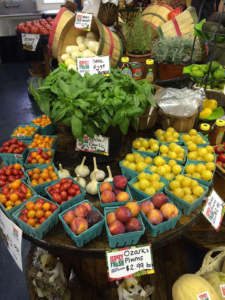 Maximum freshness: By choosing local produce at farm stands, farmers markets, pick-your-own farms and grocery stores, you pay for taste, not transportation and packaging.
Maximum freshness: By choosing local produce at farm stands, farmers markets, pick-your-own farms and grocery stores, you pay for taste, not transportation and packaging. - Unique varieties: Local farmers often grow a large assortment of unique varieties of products to provide the most flavorful choices throughout the season.
- Buying local also keeps farms and communities strong. Money spent by shoppers at local farms and by local farmers at local businesses stays in the community. Knowing your farmer can also help alleviate food safety concerns. It’s good business for everyone.
The fruits and vegetables you buy at the farmers market are the freshest and tastiest available. Fruits are allowed to ripen fully in the field and are brought directly to you—no long-distance shipping, no gassing to simulate the ripening process, no sitting for weeks in storage. This food is as real as it gets—fresh from the farm.
It is fresh and delicious and reflects the truest flavors. Shopping and cooking from the farmers market helps you to reconnect with the cycles of nature in our region. As you look forward to asparagus in spring, savor sweet corn in summer, or bake pumpkins in autumn, you reconnect with the earth, the weather, and the turning of the year.
Our farmer’s market carries a diverse and numerous selection of locally grown fruit and produce from growers within our regional area, many of the located right here in Bergen County. Our products are displayed professionally and tend to so as to provide the utmost in freshness. Our selections vary depending upon what is in season, we do however carry products such as honey and other culinary items that are available year round. The great thing about us is that if you are ever unsure about what a product is, where it came from, or how to use it, you can just ask!
Gardening – Hard Goods / Accessories
- Mulches – Choose from single, double or triple shredded mulch from a variety of colors. Bulk (cubic yd) or bagged.
- Potting Soils and Mediums – Premium Potting Soils and mediums. Perlite, Vermiculite and more
- Organic Fertilizers – Go “green” this gardening season with one of our 100% organic garden fertilizers.
- Pest Control – From ornamental and vegetable treatments, to aphid control and plant care products to choose from.
- Gardening Tools – One thing we learned over the years is if you’re going to buy a tool. Buy a good one, and we have them.
- Seed & Lawn Care – Grass seeds from shade to full sun, Kentucky Blues and Fescues and lawn care products, many organic.
- Composts – Feed the soil with some of our nutrient-rich compost. Available bulk (cubic yd) or bagged.
Why Shop at a local garden center farmer’s market
There are several ways to approach the acquisition of plants for your new or established garden. You can shop on the internet and see enhanced plant offerings, head over to one of those box stores and hope Bozo the Clown doesn’t offer you advice, don’t laugh, I’ve heard it happen. Maybe there’s Agnes down the street splitting her Day Lilys Hemerocallis and then there’s Goffle Brook Farms, a local nursery and garden center.
Big box stores with lower prices, little variety, and less intel lure shoppers unaware of the significant benefits that come with buying from independent nurseries. Not only do local garden centers tend to know everything about the specific plants in stock, but local nursery owners and staff also know your local conditions: your USDA Zone, they just experienced the same cold winter as you did, which plants are susceptible to mildew, and so on. They will steer you to the right plants for the right space—crucial to garden success. Local nurseries also offer solutions to local challenges. Next time you need a plant, head for the business that knows its business. Head over to Goffle Brook Farms at 425 Goffle Road in Ridgewood, New Jersey.
to read the full article by Donna Dorsey head on over to our gardening blog.


